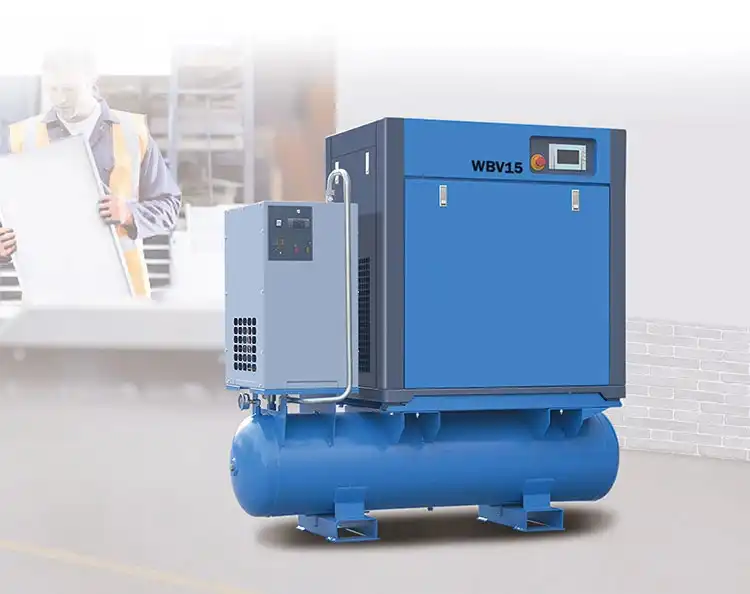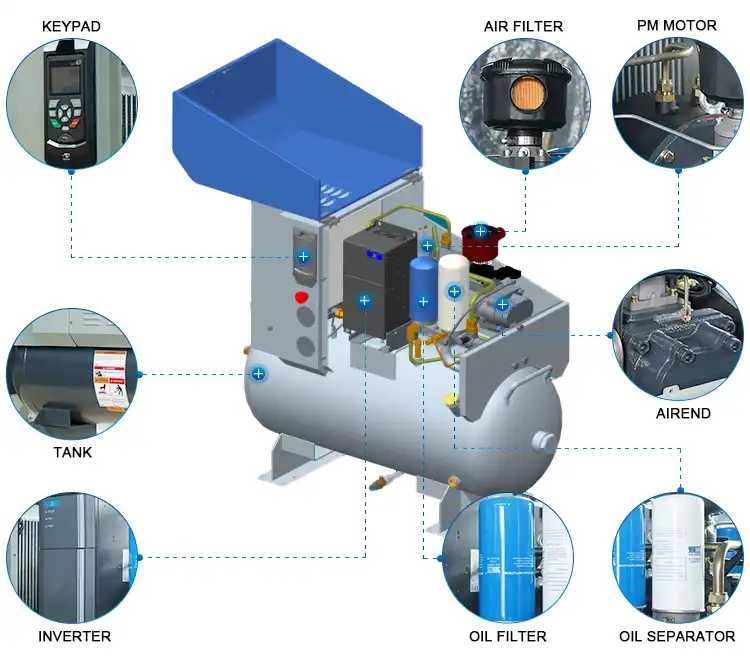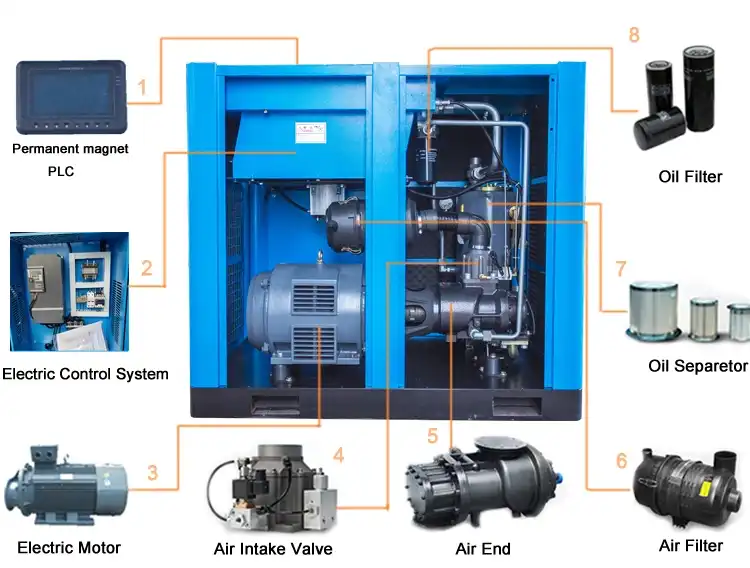In all areas of the national economy, there are a variety of flammable and explosive, corrosion, toxic and harmful gas compression, master the water lubrication oil-free technology Xinmai En team will be water-lubricated oil-free use of flammable and explosive , Corrosive gas compression, the use of low-temperature characteristics of water lubrication, compression flammable and explosive gas is absolutely safe, the use of stainless steel host corrosion resistance can compress corrosive gases. Xin Maen has successfully developed gasoline and gas compressors, biogas compressors, carbon dioxide compressors, coalbed methane, gas compressors, nitrogen compressors and other special gas compressors.
We is a leading manufacturer of industrial air compressor china manufacturers, oir free air compressor china suppliers and screw air compressor china spare parts.Based in China, our product lower noise air compressors,Oil-free screw air compressor range represents the most comprehensive portfolio of compressed air equipment offered for thousands of applications in the Oil, Textile, Food, Marine, etc. industries.
What to Look For When Buying an Air Compressor
An air compressor is a very useful tool that can help you complete many different types of construction jobs. This handy machine makes many tasks much easier, but not all of them are created equally. Understanding what to look for when buying an air compressor will help you make an informed decision. Here are some of the things you should look for. These include price, size, and energy efficiency. Also, make sure to consider the air compressor’s type.
Single-stage air compressors are quieter
When it comes to noise level, single-stage air compressors are the way to go. These machines have fewer moving parts and are quieter than 2-stage models. Single-stage air compressors use an axial flow design and can be quieter than their dual-stage counterparts. Single-stage air compressors can run longer and at lower pressures. Single-stage air compressors can be used for light industrial applications. They have a long life expectancy, with some models lasting for over 3 thousand hours.
While some single-stage air compressors are quieter than 2-stage air compressors, both models have noise-reduction features. One type features rubber parts, which are designed to dampen noise. Another feature makes a compressor quieter: its location near the job site. Some models feature rubber base plugs and rubber mats to reduce floor vibrations. In addition to using these features, single-stage compressors are easier to transport.
Noise levels are important when choosing an air compressor. Some machines are too noisy for comfortable work, and some businesses don’t want to expose customers to noise-generating air compressors. Other noise levels can even endanger workers’ health. Single-stage air compressors are more affordable than dual-stage compressors. They are also quieter and more powerful. But be prepared for the noise. Some single-stage air compressors are still noisy.
Compared to their 2-stage counterparts, single-stage compressors are quieter when running at full capacity. However, double-stage compressors are quieter on low capacities than single-stage units. Those with variable speed are quietest at lower capacities. The difference is about 10db. If you’re concerned about the noise level, you should consider a 2-stage air compressor. But if you have a small workshop, it may not be suitable for you.
One-stage air compressors are generally more efficient than 2-stage air compressors. The noise from a 2-stage air compressor is lower because there’s no intermediate stage. Single-stage air compressors also use a piston that rotates in a single stage, while dual-stage air compressors, also known as duplex models, are more efficient. A single-stage air compressor is quieter, but double-stage compressors are louder.
Two-stage air compressors are more energy efficient
Two-stage air compressors are more energy-efficient than single-stage machines. The efficiency of 2-stage air compressors is increased through a combination of improved efficiency and increased longevity. These machines can store more air and have higher compression ratios. One model of a 2-stage compressor can hold approximately 83 cubic feet of air at 100 PSI and 120 cubic feet at 150 PSI. A 2-stage compressor is also quieter.
Two-stage air compressors are more energy-efficient because they have 2 pistons instead of 1. These air compressors achieve a higher pressure rating and recover more quickly. This type of compressor is perfect for jobs that require high air pressure for a prolonged period of time. In addition, they can operate multiple tools simultaneously. This makes them better for commercial and industrial use. Listed below are some benefits of 2-stage air compressors.
Single-stage air compressors can power tools in the garage or kitchen, but they are not as reliable for industrial applications. Single-stage compressors have larger parts that 10d to experience condensation. Furthermore, single-stage compressors do not last long in continuous use and are less energy-efficient than 2-stage 1s. Whether you’re using the compressor for a single tradesperson, a small crew, or a large construction crew, 2-stage compressors are the best choice.
Single-stage air compressors are often used in small-scale food preparation and production. Single-stage air compressors are easy to transport between locations, and can be plugged into several electrical outlets. Single-stage compressors are also ideal for high-volume food processing. A dual-stage air compressor is ideal for industrial use. In some cases, you can even move the single-stage air compressor between 2-stage air compressors.
Single-stage compressors often cycle too quickly, drawing more electricity than 2-stage units. A variable speed unit stays on a low speed for hours at a time. Single-stage air conditioners force you to lower your thermostat settings while single-stage air conditioners run too often. Both units are energy-efficient but they are not as energy-efficient as variable-speed compressors. The main difference is that single-stage air conditioners 10d to drain the power source quicker.
Piston-driven air compressors are quieter
A piston-driven air compressor is 1 of the quietest types of air compressors. It is less noisy than reciprocating air compressors. A piston-driven air compressor can reach 62 decibels, while a scroll compressor is around half that volume. The 2 main components of a scroll air compressor are the piston and the helical screw. These air compressors are both very efficient and quiet.
Older compressors are incredibly noisy. They produce a “wumpa” noise similar to a large engine. They are also capable of producing a high-pitched whine. These noises can be deafening, especially in a small workshop. That’s why it’s essential to look for a quiet compressor. But what makes a compressor quiet? Read on to learn more about this essential tool.
Another difference between piston-driven air compressors and electric-driven air compressors is the power source. Electric air compressors produce less noise than gas-powered compressors, which use an engine. Piston-driven air compressors are also more efficient. They also generate less heat, making them an ideal choice for offices and other settings where noise is a problem. The best way to decide between the 2 types of air compressors is to check the manufacturer’s warranty and read the ‘Description’.
Noise reduction is the first priority of a compressor’s owner, so make sure that you have the right model. If you’re working on something sensitive, don’t place the compressor too close to a building where people might be nearby. Noise can be very disruptive to the workspace and can cause health problems. To help combat noise, you’ll need to buy a quiet air compressor. And don’t forget to consider its location: Piston-driven air compressors are quieter than their reciprocating counterparts.
Piston-driven air compressors are quiet because the piston is made of thin metal and more rubber, which absorbs the sound. Unlike reciprocating air compressors, piston-driven air compressors are more efficient than their dual-piston cousins, which are quieter and more powerful. So which type is right for you? Take a look at some of the main differences between the 2. If you want a quiet compressor, make sure it meets the specifications required by the job you’re working on.
Oil-lubricated air compressors are more cost-effective
There are several reasons why oil-lubricated air compressors are more expensive than dry-type air compressors. First of all, oil-lubricated air compressors 10d to be more reliable and quiet. Additionally, oil-lubricated air compressors require fewer parts and can last longer than dry-type air compressors. These are just a few of the many benefits of using oil-lubricated air compressors.
Oil-free air compressors have some disadvantages. They are less durable and may not be as efficient as oil-lubricated models. Additionally, because oil-lubricated air compressors use oil, they can get very noisy. While they are less expensive, they are not the best option for heavy-duty work. However, modern oil-free air compressors have soundproofing and are suitable for industrial use.
When purchasing an oil-lubricated air compressor, make sure to choose 1 with a tank capacity that meets your needs and your space. Larger tanks can be more expensive than small tanks, but larger units are easier to move around. Also, be sure to consider the weight and size of the portable air compressors when making your choice. If the weight is too large, you may have trouble carrying it from place to place.
Another benefit of using oil-lubricated air compressors is their reduced need for oil. These models can last up to a decade longer than oil-free counterparts. Oil-free air compressors are more affordable and can achieve the same high performance as their oil-lubricated counterparts. Many industrial applications benefit from these air compressors. So, which 1 is right for you? We’ve listed a few of them below.
Another benefit of choosing an oil-lubricated air compressor is the reduced cost of maintenance. This type is more durable than its oil-lubricated counterparts, which require regular oil changes to keep them running smoothly. However, it is not feasible to transport an oil-lubricated compressor, which means that you must install it permanently to keep it working efficiently. In addition, these air compressors are difficult to move and are not portable, which can limit your ability to use it in a pinch.

